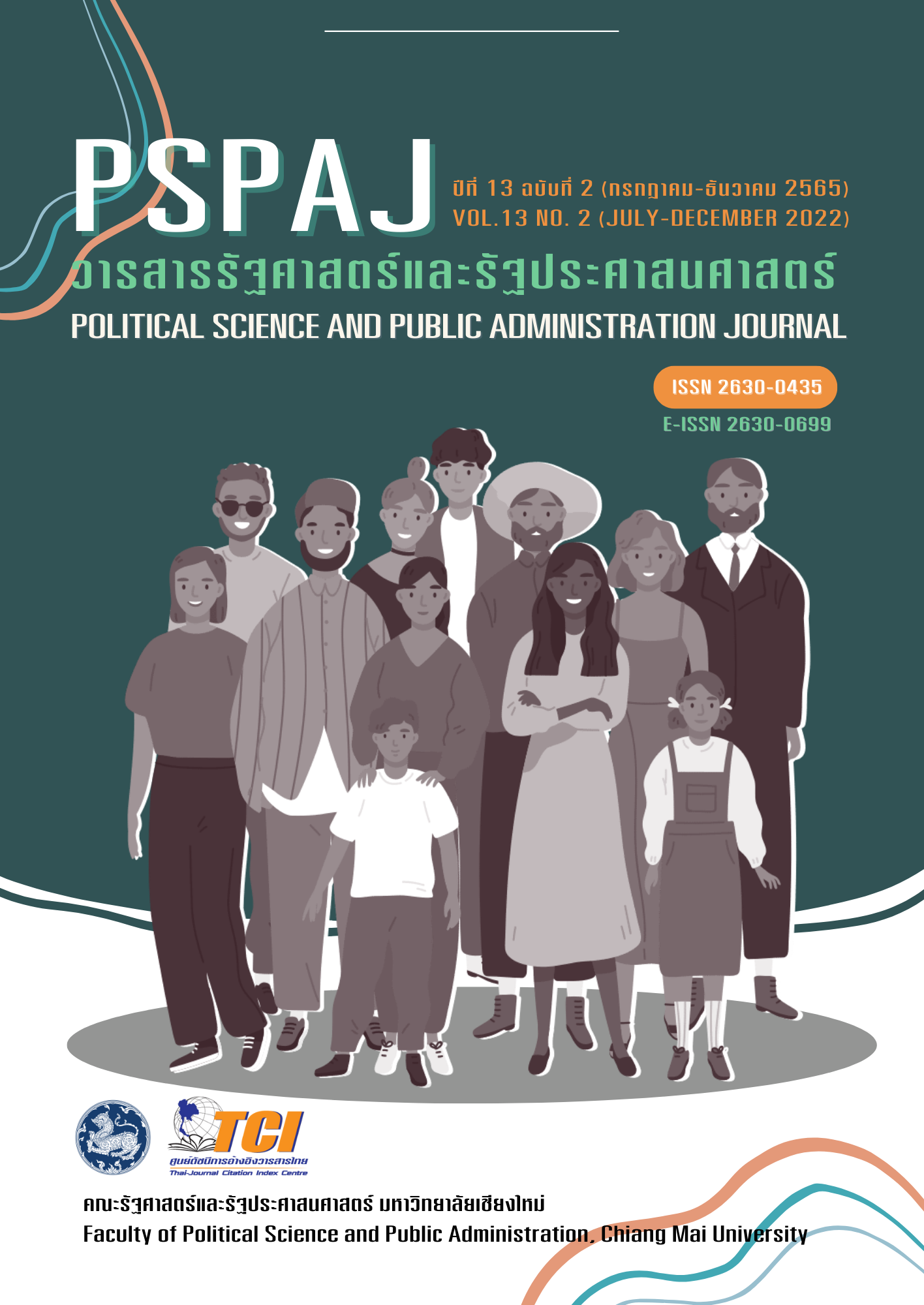Development of an Elderly Learning Ecosystem: A Case Study of Village Number 11 Baan Tung Pa Ka Nuea Tung Phee Subdistrict Administrative Organization, Mae Wang District, Chiang Mai Province
Main Article Content
Abstract
The objective of this research was to improve the learning ecosystem for elderly in Tung Phee Subdistrict Administrative Organization, Mae Wang District, Chiang Mai Province. The research was qualitative, and the specific area of study was Village Number 11 of Tung Pa Kha Nuea, Tung Phee Subdistrict Administrative Organization, Mae Wang District, Chiang Mai Province. The primary informants were officers of the Subdistrict Administrative Organization, government officers in the Subdistrict, community leaders, citizens, social groups, community organizations, and elderly. Data collection used in-depth interviews and focus group discussions, including data analysis by creating an inductive conclusion from analysis of documents together with interviews and group discussions. The study showed that the learning ecosystem of elderly in Village Number 11, Tung Phee Subdistrict could be divided into three main parts. The first factor was learning utilities or learning environment. The second factor was learning ecosystem conditions. The last factor was activities supporting the learning process of elderly. The factors supporting the learning process and the learning atmosphere had different production mechanisms, leading to 12 activities that support the learning process of elderly in Village Number 11, Tung Phee Subdistrict. These 12 activities happened under three learning ecosystem conditions which were supportive learning, atmosphere supporting diverse learning methods for the elderly, and driving force of learning process through organization’s visions and missions. Each activity was aimed at certain learning dimensions, including economic, social, and static dimensions. The activities led to four goals of the lifelong learning process: knowledge, practice, becoming, and co-existing through difference.
Downloads
Article Details

This work is licensed under a Creative Commons Attribution-NonCommercial-NoDerivatives 4.0 International License.
- เนื้อหาและข้อมูลที่ลงตีพิมพ์ในวารสารรัฐศาสตร์และรัฐประศาสนศาสตร์ถือเป็นข้อคิดเห็นและความรับผิดชอบของผู้เขียนบทความโดยตรง ซึ่งกองบรรณาธิการวารสารรัฐศาสตร์และรัฐประศาสนศาสตร์ ไม่จำเป็นต้องเห็นด้วย หรือร่วมรับผิดชอบใดๆ
- บทความและข้อมูล ที่ได้รับการตีพิมพ์ในวารสารรัฐศาสตร์และรัฐประศาสนศาสตร์ ถือเป็นลิขสิทธิ์ของวารสาร หากบุคคลหรือหน่วยงานใดต้องการนำข้อมูลไปใช้ประโยชน์ในทางวิชาการ ขอให้อ้างอิงแหล่งที่มาด้วย
References
กานต์ชนิต สุตาคำ. (2565). การพัฒนาตัวแบบระบบนิเวศการเรียนรู้ของผู้สูงอายุ องค์การบริหารส่วนตำบลทุ่งปี๊ อำเภอแม่วาง จังหวัดเชียงใหม่ (วิทยานิพนธ์รัฐประศาสนศาสตรมหาบัณฑิต), มหาวิทยาลัยเชียงใหม่.
โกสินล์ ชี้ทางดี. (2562). แนวทางการพัฒนาการดำเนินงานโรงเรียนผู้สูงอายุในจังหวัดลพบุรี. วารสารวิชาการ มหาวิทยาลัยปทุมธานี, 11(2), 325-336.
ขนิษฐา นันทบุตร และคณะ. (2559). คู่มือการประชุมเชิงปฏิบัติการเพื่อฟื้นฟูทักษะการวิเคราะห์และนำใช้ข้อมูลตำบล. สืบค้นเมื่อ 4 สิงหาคม 2564, จาก https://thaihealthycommunity.org/?p=15772
วัชรากรณ์ ชีวโศภิษฐ์. (2562). สังคมผู้สูงอายุ: ปัจจัยการตลาดที่เปลี่ยนไป. วารสารมหาจุฬานาครทรรศน์, 6(1), 38-54.
สุธีรา บัวทอง, สุทธิพงศ์ สภาพอัตถ์, และศิริณา จิตต์จรัส. (2558). ผู้สูงอายุกับเหตุผลในการเรียนรู้วิธีการเรียนรู้และสิงที่ต้องการเรียนรู้. วารสารศึกษาศาสตร์มหาวิทยาลัยศิลปากร, 12(1), 6-17.
ศิริพงษ์ ลดาวัลย์ ณ อยุธยา. (2555). แนวความคิดและทฤษฎีรัฐประศาสนศาสตร์. เชียงใหม่: ห้างหุ้นส่วน จำกัด ธนุชพริ้นติ้ง.
ศูนย์ข้อมูลประเทศไทย. (2564). ศูนย์ข้อมูลประเทศไทย จังหวัดเชียงใหม่. สืบค้นเมื่อ 10 พฤษภาคม 2565, จาก https://thailand.kapook.com/
องค์การบริหารส่วนตำบลทุ่งปี๊. (2559). แผนยุทธศาสตร์การพัฒนาองค์การบริหารส่วนตำบลทุ่งปี๊. สืบค้นเมื่อ 4 สิงหาคม 2563, จาก http://www.tungpheesao.go.th
Afterschool Alliance. (2014). STEM Learning Across Settings: Cultivating Learning Ecosystems. Retrieved March 18, 2020, from https://afterschoolalliance.org
Gütl, C., & Chang, V. (2007). Ecosystem-based Theoretical Models for Learning in Environments of the 21st Century. Retrieved March 18, 2020, from https://www.researchgate.net/publication/26584705_Ecosystem-based_Theoretical_Models_for_Learning_in_Environments_of_the_21st_Century
Loffler, E. (2010). Why Co-production is an Important Topic for Local Government. Retrieved March 14, 2020, from http://www.govint.org/coproduction_why_it_is_important.pdf
Mulgan, G. (2014). Innovation in the Public Sector How Can Public Organizations Better Create, Improve and Adapt. Retrieved March 18, 2020, from https://media.nesta.org.uk/innovation_in_the_public_sector-.pdf
Hill, J. R., Raven, A., & Han, S. (2002). Connections in Web-Based Learning Environments: A Research-Based Model for Community Building. Retrieved March 18, 2020, from https://www.researchgate.net/publication/234687987
Kattel, R., Cepilovs, A., Drechsler, W., Kalvet, T., Lember, V., & Tõnurist, P. (2014). Can We Measure Public Sector Innovation? A Literature Review. Retrieved March 18, 2020, from https://shorturl.asia/S1PlA
SEAC. (2018). The 4 Elements of a Learning Ecosystem. Retrieved March 18, 2020, from https://www.seasiacenter.com/insights/the-4-elements-of-a-learning-ecosystem/
UNESCO. (1996). Learning: The Treasure Within – Report to UNESCO of the International Commission on Education for the Twenty-first Century. Retrieved March 16, 2020, from https://www.gcedclearinghouse.org/sites/default/files/resources


